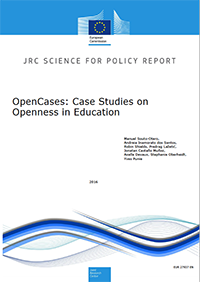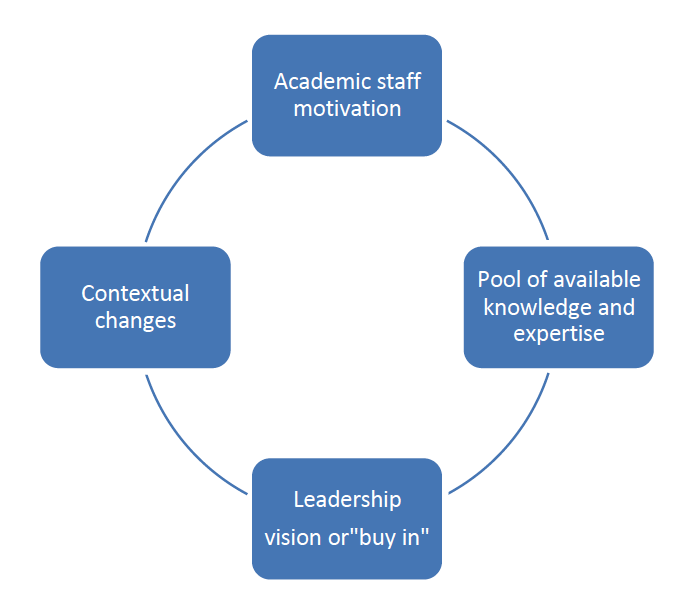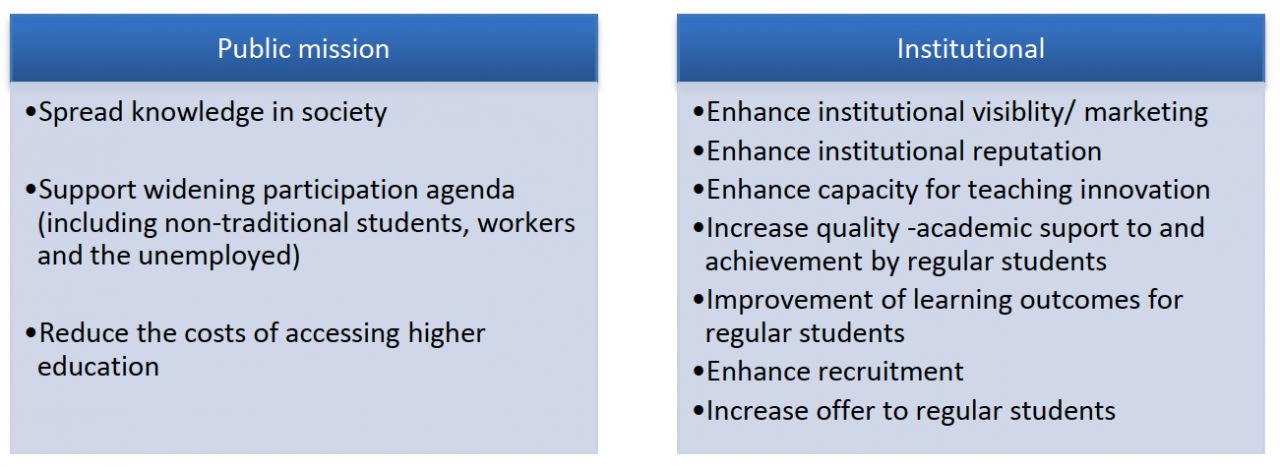Case Studies on Openness in Education
Yesterday the JRC IPTS published the report OpenCases: Case Studies on Openness in Education. This report is the final outcome of the study OpenCases: case studies on openness in education. The study was carried out by the IPTS in collaboration with the University of Bath as part of the OpenEdu project. The report is based on interviewees with inside knowledge of their organisations. There are 9 cases in this report of these organisations/projects around Europe.
- ETH Zurich
- France Université Numérique (french mooc platform)

Cover report - OER Universitas (OERu
- TU Delft
- Universidad Carlos III de Madrid (UC3M)
- Open AGH E-Textbooks
- Virtual University of Bavaria (BVU)
- OpenupEd
- ALISON
I was one of the interviewees for the TU Delft case and think they have done a great job in composing the report and our case.
The summary of our case study (the full case study is on page 51-60 of the report):
Established in 1842, Delft University of Technology (Delft) is the largest and oldest Dutch public technical university and a high-ranking university worldwide in the areas of engineering and technology. Delft started its institutional engagement with open education in 2006, and today it is heavily engaged in open education within the institution and outside, through representation in the leadership structures of various open education networks. Delft is particularly active in the area of open teaching. Here, Delft has a long-term engagement in providing Open Courseware (OCW), and more recently MOOCs. Delft’s reported that its engagement with open education is based on its conception of publicly financed higher education as a ‘public good’. Teaching resources and research that are paid for through public funds should be made available openly. Open education is also seen as an important tool to widen participation in higher education, which Delft staff reported to consider a central social justice concern to which the university needs to respond to. Delft open teaching initiatives are widely used: its OCW website has had over 1 million unique visitors (1,300 per day currently), and Delft has registered around 865,000 enrolments in its MOOCs. The university has made over 10,000 lectures available via OCW and i-Tunes.
Delft leadership is clear that academics need support to take part in open education. This has materialised in investment in e-learning officers, teaching assistants’ time -in order to help prepare courses to go online-, or even graphic designers to improve MOOC slides given the marketing effect of open education. Delft also provides a range of guidance documents to its academics, so that they “know-how” to participate in open education.
Delft has a well-structured approach to quality assurance for open education materials, which in addition to standard University procedures entails evaluation by e-learning officers, checking of beta versions by students and staff, pre and post participation questionnaires and the production of summary reports containing lessons learnt.
Delft reported to currently invest around 4 million Euro per year in the delivery of its open, online and blended courses and a small research team on open education. Delft believes that there is no scope from simply selling content, so it makes content available for free. Income can be generated from other services around the content that is shared for free: certification, top-up courses or on-campus provision for example. As such, the university has put in place a range of strategies to create income streams from or in association with its open education initiatives:
- from MOOCs and -to a much lesser extent- OCW certification,
- third-party use of its open education materials for commercial purposes,
- activities in the area of professional education and continuing education,
- attraction of additional students to its regular courses, and
- externally funded research projects.
The objective of the creation of these income streams is to generate resources that can be reinvested in open education. Open education was reported to drive up Delft’s capacity for innovation, recruitment (with a conversion rate from MOOC participation into application for a Delft regular course at around 0.1% in two courses for which data is available), teaching quality (there is evidence of its potential to improve Delft students’ pass rates, average marks and satisfaction), and visibility and reputation in an increasing competitive global higher education landscape.
In terms of open research, Delft has collaborated mainly with Dutch universities in the preparation of position papers and in lobbying in favour of open research, and the creation of an open data centre in the Netherlands. It also has an institutional research repository and encourages open access publication through the payment of fees to make articles open access, negotiations with publishers and the provision of information on open access journals to its academics. Delft has developed open software solutions for a variety of purposes.
The information gathered for this case study underlined that a challenge for open education is to ensure that its widening participation agenda is not completely subsumed by the other benefits generated by open education (reputation, visibility, income generation). Other challenges for open education, identified by Delft, are its need to become better known and used by politicians and the design of a series of incentives –which could take the form of inclusion of open education in university rankings, as well as a variety of other measures- and support structures to stimulate universities and enable academics to be engaged with open education. This is seen as a particularly important point for Europe, where institutions are lagging behind in open education compared to institutions in other areas of the world.
Future areas of work for Delft on open education could include the inclusion of MOOCs as independent parts of its own curriculum (instead of being a tool to support classroom-based provision through blended learning and flipped classroom strategies) and further development of its open management, an area that the university has not explored in detail.
A remark to make is that our cases was composed last year and the development of the TU Delft open activities are progressing rather fast. I had the opportunity to make some small updates last month, so the numbers are up to date.
The cases studies not only focus on open teaching, but also open research and the not commonly included open operations.
Syntheses of the cases
From all these cases the authors found for enabling conditions:

They also see diffferent rationales for involvement in Open Education. From spread knowledge in society to enhance recruitment:

Recommendations
Based on the discussion and conclusions the authors have formulated these recommendations:
Rationale and enabling conditions
- The agenda for widening participation through OE should be revitalised, and established as a priority at national, regional and institutional level.
- In order to scale-up the take of OE initiatives, it is recommended that sectoral organisations have a key role in the establishment of systems to enhance university leadership’s 'buy in' in OE.
- The establishment of additional incentives for HEIs’ involvement in OE should receive consideration. This could take the form of additional funding and/ or regulation. The inclusion of OE as an indicator in university rankings would provide a strong incentive for HEIs to be involved in OE.
Teaching
- HEIs and other stakeholders design and implement more effective systems to raise staff awareness of and expertise on OE and that they provide greater incentives for staff to become involved in open teaching in terms of career progression and in workload allocations.
- better integrate training on OE initiatives with the general training they offer, so that training on pedagogical, research and operational aspects includes reference to open education whenever applicable.
- stimulate the production of coherent curricula through OE. Today, the elements of OE that aim to offer full educational experiences (such as MOOCs) tend to focus on introductory and ‘taster’ courses (to attract large numbers of learners and attract students to more specialized regular universities programmes). Greater of learning analytics can also help to improve open educational experiences.
- HEIs and other stakeholders work on the design of trustworthy and cost-effective assessment procedures for OE to increase the award of academic credit to recognise the learning acquired through OE.
Research
- HEIs and other stakeholders explore ways to design more effective systems of incentives for staff to become involved in open research. These can include the adoption of models that require that open research measures be considered in applications for (public) funding or research assessment exercises.
- HEIs explore ways to better support academics in the process of inclusion of research outputs in open repositories and/ or explore ways to automatize that process, to ensure that a greater volume of research is made available “open” timely.
- institutions and other stakeholders would need to place greater emphasis on the establishment of systems for the conservation of OER, as this is a relatively neglected but crucial topic, given the pace at which technologies evolve.
Operations
- It is recommended that HEIs explore ways in which open implementation and co-decision may be used to contribute to the achievement of their institutional objectives and enhance the transparency, engagement and quality of their decision-making processes.
Sustainable strategies
- put greater emphasis on the measurement of the inputs to OE and of its outcomes.
- HEIs and other stakeholders explore ways in which the sustainability of OE initiatives can be further enhanced. This may not only include the diversification of funding sources and pooling of resources for OE initiatives but also (at the individual academic level) the production of OER in such formats that they can be easily updated.
- European and national institutions put systems in place to ensure the presence of less spoken languages in OE, so that OE can be accessed by individuals with competence in different languages and fewer people are excluded from the advantages of OE.
Outcomes
- HEIs, governmental actors and other stakeholders also expand the ways in which success is measured in the area of OE, to include aspects beyond volume of use, and that data is systematically collected on those success measures. These may include the contribution of OE to local or national needs, HEIs’ visibility, staff career progression, learning acquired, improvements in terms of teaching and learning processes, progress in education or employability results/ labour market integration.
- HEIs and policy-makers ensure that reliable data on the profile of the users of OE is systematically collected at the institutional and systemic level, so as to be able to better assess the contribution of OE to the widening participation agenda.
Conclusion
Althogether it is a very good report with useful recommendation for new policy reform and actions for Open Education in Europe. I would certainly recommend every institional leader to read it and get inspired to move their own institute into the era of openness in Europe.
On a personal note, it was a pleasure working with these very smart and nice authors.
Reference
- Souto-Otero, M., Inamorato dos Santos, A., Shields, R., Lažetić, P., Castaño-Muñoz, J., Devaux, A., Oberheidt, S., Punie, Y. (2016) OpenCases: Case Studies on Openness in Education. Institute for Prospective Technological Studies, Joint Research Centre, European Commission. EUR 27937 EN, doi:10.2791/039825
No feedback yet
Form is loading...